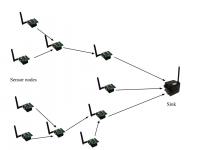Intelligent Medium Access Control Protocols for Wireless Sensor Networks
Wireless sensor networks (WSNs) can help people access a large amount of reliable information from any place, in any environment and at any time. However, large-scale deployments, battery powered sensor nodes, limited radio resource, low computation capability and other unique properties represent serious challenges to the development of WSNs. Therefore, in the majority of wireless sensor network applications it is difficult to achieve high energy efficiency and good network performance.
The aim of the project is to develop an intelligent MAC protocol for WSNs with the objectives of prolonging the lifetime and improving the overall performance of WSNs. In particularly, this project bridges the fields of communication and machine learning. Multiple learning techniques will be investigated in this project, such as reinforcement learning, neural networks, etc. These techniques assist individual sensor nodes to self-organise themselves with the purpose of achieve best scheduling. Compared to existing approaches, the envisaged protocols will provide high throughput and low energy consumption. This adaptability of the proposed approach makes it suitable for a wide range of topologies, with high scalability and intelligent self-organisation capability.
OPNET Modeler is being used to implement and evaluate the proposed ideas and MATLAB is used for the result validation process. Some proposed schemes will be examined through hardware implementation.
Key objectives
- To explore the benefits of machine learning techniques in the design of MAC protocols.
- To establish a set of wireless sensor network models in OPNET and implement the proposed ideas using these models.
- To develop a complete MAC protocol which is expected to achieve perfect scheduling in a changing environment.
- To analyse the simulation outcomes and demonstrate substantial performance improvements.

Members
- Yan Yan
- Paul Mitchell
- Tim Clarke
- David Grace
Dates
- Start: June 2011
Research
